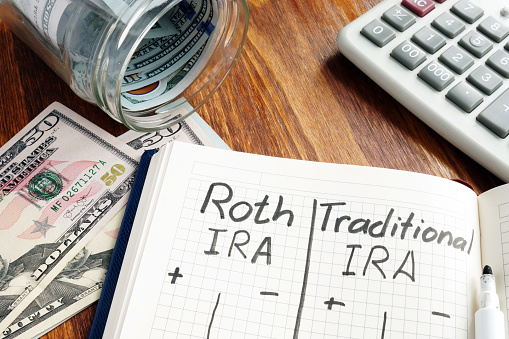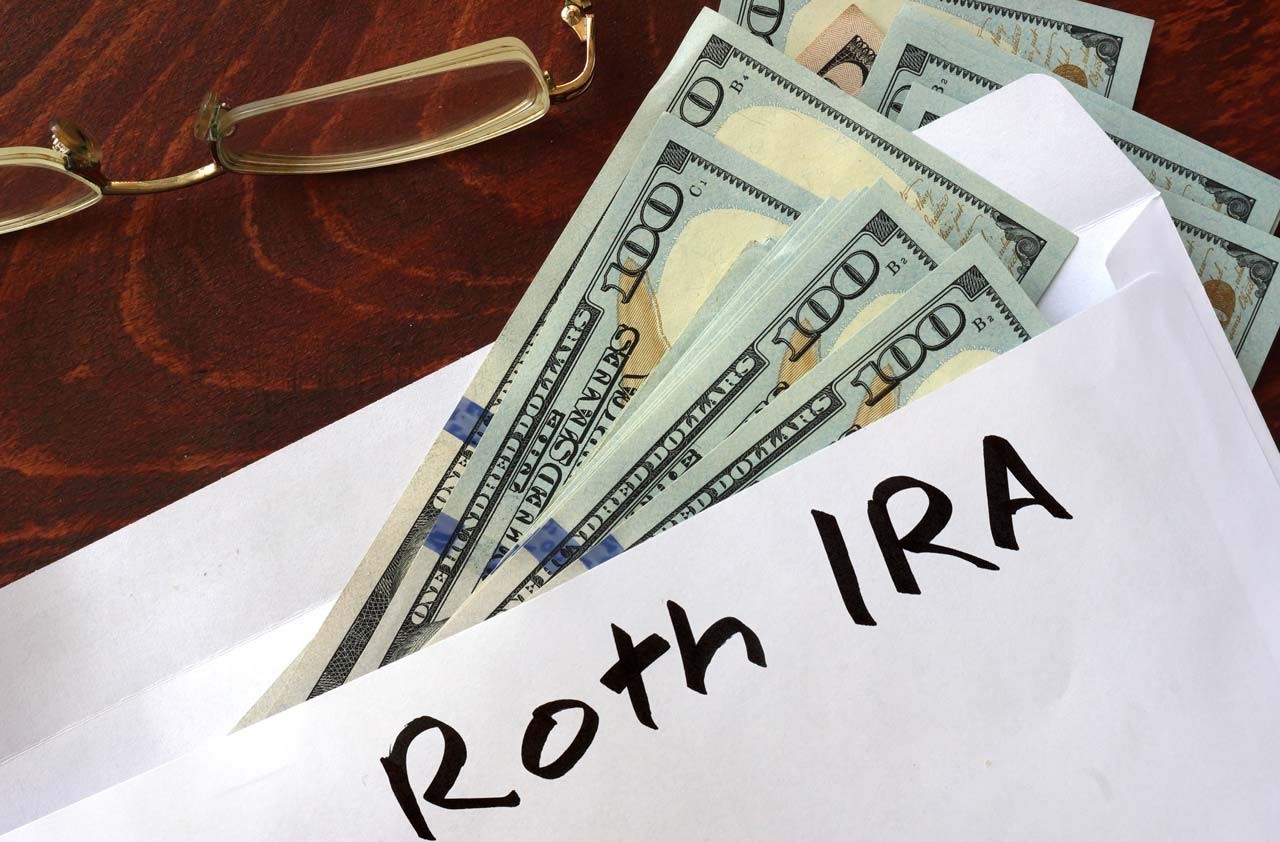How Long You Must Wait to Make Penalty-Free Withdrawals After Converting to a Roth IRA
The timing of converting money from a traditional IRA to a Roth can affect how long you must wait before you’re allowed to withdraw money without penalty.


Profit and prosper with the best of Kiplinger's advice on investing, taxes, retirement, personal finance and much more. Delivered daily. Enter your email in the box and click Sign Me Up.
You are now subscribed
Your newsletter sign-up was successful
Want to add more newsletters?

Delivered daily
Kiplinger Today
Profit and prosper with the best of Kiplinger's advice on investing, taxes, retirement, personal finance and much more delivered daily. Smart money moves start here.

Sent five days a week
Kiplinger A Step Ahead
Get practical help to make better financial decisions in your everyday life, from spending to savings on top deals.

Delivered daily
Kiplinger Closing Bell
Get today's biggest financial and investing headlines delivered to your inbox every day the U.S. stock market is open.

Sent twice a week
Kiplinger Adviser Intel
Financial pros across the country share best practices and fresh tactics to preserve and grow your wealth.

Delivered weekly
Kiplinger Tax Tips
Trim your federal and state tax bills with practical tax-planning and tax-cutting strategies.

Sent twice a week
Kiplinger Retirement Tips
Your twice-a-week guide to planning and enjoying a financially secure and richly rewarding retirement

Sent bimonthly.
Kiplinger Adviser Angle
Insights for advisers, wealth managers and other financial professionals.

Sent twice a week
Kiplinger Investing Weekly
Your twice-a-week roundup of promising stocks, funds, companies and industries you should consider, ones you should avoid, and why.

Sent weekly for six weeks
Kiplinger Invest for Retirement
Your step-by-step six-part series on how to invest for retirement, from devising a successful strategy to exactly which investments to choose.
Question: If you convert a traditional IRA to a Roth IRA, do early-withdrawal penalties apply?
Answer: Roth conversions are not subject to a 10% early-withdrawal penalty at the time of the conversion. But if you tap the converted amount, you need to be mindful of the five-year rule for penalties.
The rule is simple: In order to withdraw the converted money penalty-free, you have to wait five years from the tax year in which you made the conversion if you’re younger than 59 1/2. In practice, that means if you convert a regular IRA to a Roth IRA in January 2020, you’ll need to wait until January 2025 to avoid early-withdrawal penalties. But depending on when you convert your account, you may not need to wait a full 60 months. If you convert an account in December 2020, the finish line doesn’t move: You’ll still need to wait until January 2025, but that means having 11 fewer months to wait.
From just $107.88 $24.99 for Kiplinger Personal Finance
Become a smarter, better informed investor. Subscribe from just $107.88 $24.99, plus get up to 4 Special Issues

Sign up for Kiplinger’s Free Newsletters
Profit and prosper with the best of expert advice on investing, taxes, retirement, personal finance and more - straight to your e-mail.
Profit and prosper with the best of expert advice - straight to your e-mail.
That’s straightforward enough, but what if you made a number of Roth conversions over the past several years? “The thing to be mindful of is that each conversion is subject to its own five-year rule,” says Mike Giefer, a certified financial planner and wealth manager with Creative Planning in Minneapolis. “Lots of people may systematically convert IRAs over multiple years, and the clock resets for each tax year.” If you converted one account in the final week of December and another in the first week of January, the latter will be subject to early-withdrawal penalties for an extra year.
But once you turn age 59 1/2 -- poof! -– the five-year rule for early-withdrawal penalties goes away.
Converting a traditional retirement account to a Roth IRA is a great way to reap the benefit of tax-free withdrawals and an especially good idea if you expect your tax rate to be higher in retirement (although you may owe taxes on some or all of the amount when you convert it).
Profit and prosper with the best of Kiplinger's advice on investing, taxes, retirement, personal finance and much more. Delivered daily. Enter your email in the box and click Sign Me Up.

-
 How to Turn Your 401(k) Into A Real Estate Empire
How to Turn Your 401(k) Into A Real Estate EmpireTapping your 401(k) to purchase investment properties is risky, but it could deliver valuable rental income in your golden years.
-
 My First $1 Million: Retired Nuclear Plant Supervisor, 68
My First $1 Million: Retired Nuclear Plant Supervisor, 68Ever wonder how someone who's made a million dollars or more did it? Kiplinger's My First $1 Million series uncovers the answers.
-
 How to Position Investments to Minimize Taxes for Your Heirs
How to Position Investments to Minimize Taxes for Your HeirsTo minimize your heirs' tax burden, focus on aligning your investment account types and assets with your estate plan, and pay attention to the impact of RMDs.
-
 Pushing the FDIC $250,000 Limit
Pushing the FDIC $250,000 Limitinsurance If your bank or credit union balance exceeds the limit, you can still be covered by FDIC insurance with planning.
-
 What Being an "Authorized User" Does to Your Credit Score
What Being an "Authorized User" Does to Your Credit Scorecredit & debt An adult child's credit score may dip–or even rise–after he or she is removed as an authorized user of a parent's credit card.
-
 Why Stocks Are Best Held in a Roth IRA
Why Stocks Are Best Held in a Roth IRAstocks Holding stocks in a Roth IRA makes the most of this tax-free account's features.
-
 How to Use a Grandparent’s 529 Account to Reimburse College Expenses
How to Use a Grandparent’s 529 Account to Reimburse College Expenses529 Plans Through timely withdrawals and good recordkeeping, a grandparent’s 529 college-savings plan can help families recoup money spent on college.
-
 How to Find the Right Online Bank for You
How to Find the Right Online Bank for Yousavings The higher interest rates offered by online banks sure are tempting, but do your research first.
-
 What Grandparents Need to Know About Using Savings Bonds for a Grandchild’s Education
What Grandparents Need to Know About Using Savings Bonds for a Grandchild’s EducationTax Breaks It’s not easy, but grandparents can avoid a tax bill when redeeming savings bonds to pay for a grandchild’s college costs.
-
 How to Protect Your Home From Deed Fraud
How to Protect Your Home From Deed FraudScams Protect yourself from deed theft with these free steps. You don’t need to pay a company to protect your your home title.
-
 How to Add Treasury Bonds, Bills and Notes to an IRA
How to Add Treasury Bonds, Bills and Notes to an IRAinvesting If you are wondering how to add Treasury bills, bonds and notes to an IRA, there are ways to do so.